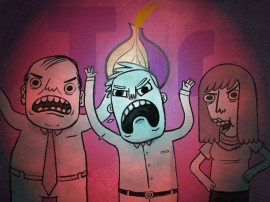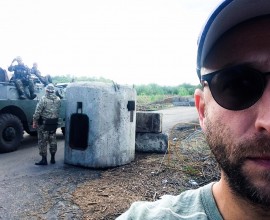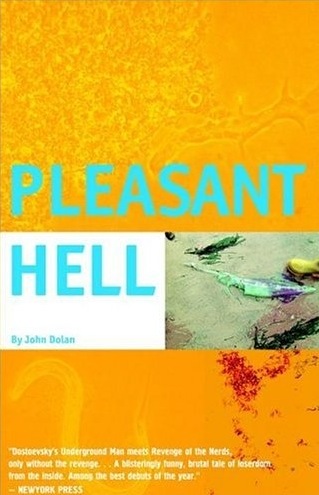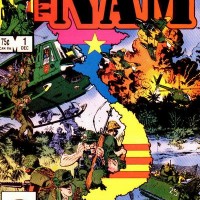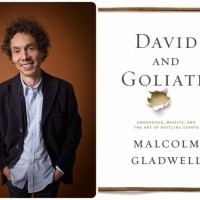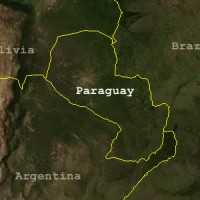
This article was first published in The eXile on October 2, 2003
The new big thing on the web is all these sites with names like “I Hate France,” with supposed datelines of French military history, supposedly proving how the French are total cowards. If you want to see a sample of this dumbass Frog bashing, try this:
www.albinoblacksheep.com/text/france.html
(more…)
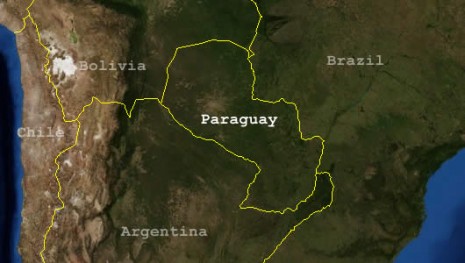
FRESNO, CA — Name a country that lost at least two thirds of its male population fighting three countries at once, and nearly managed to beat all three before being ground down and damn near wiped out. Second clue: this happened during the second-bloodiest war ever fought in the Western Hemisphere.
Whatever country you nominated, I bet it wasn’t Paraguay during the War of the Triple Alliance, 1864-1870. To most war buffs the War of the Triple Alliance rates a big shrug, and Paraguay is more like a punchline than a country, a tiny landlocked South American sweatbox full of Nazi escapees creaking around cursing arthritis and the T-34. Paraguay is like a country by Mel Brooks.
But Paraguay is the correct answer, and I’m here to give the place its long overdue due. By the way, if you’re wondering what the first-bloodiest war in the Americas was, shame on you! Blue and Gray ring any bells? Gettysburg? America’s still got #1 all locked up, thanks to the Civil War, just possibly the greatest war ever. More than 600,000 dead, and most of them soldiers who died honorably, in open battle. Until you’ve been studying real war for a few years, you don’t realize how rare that kind of high, clean body count is. Like I’ve said before, most conflict is massacre and counter-massacre. Battles are rare.
And that reminds me, I have to quibble with these rankings, even though I feel dirty saying anything that could lower the ranking of our Civil War. What worries me is nobody seems to count the Spanish-vs-Aztec or Spanish-vs-Inca wars in the rankings. Nobody’s very sure how many people died in Mexico, but the simplest answer is “Most of ’em,” and since the Inca have been fighting the Spanish for 500 years at last count, they deserve an entry in the numbers game too.
But let’s say we rule out those conquistador wars, and stick to more standard nation-vs-nation fights; you still have to wonder why this amazing War of the Triple Alliance doesn’t get any publicity. Basically the answer is because the whole thing is a downer. The countries that fought it are downers: Who wants to think about Argentina if they don’t have to? And Uruguay, I had to do a report on Uruguay in fifth grade, picked it because nobody else was going to, started out rooting for it as El Underdog, but by the end I decided it deserved to be just Uruguay. I mean, being a suburb of Argentina, the East St. Louis to Buenos Aires—what could be more pathetic? If only I’d picked the other Guay! Then I’d have changed my whole take on the continent a lot sooner.
Then there’s the fact that it was a real stupid war. One of the best accounts of the whole thing is titled “El Guerro el Mas Stupido.” Which is why I’m not going to waste much time on how it got started. The official reason is that Brazil and Argentina were messing with Uruguayan politics and when the Uruguayan minority party, the Blancos, asked their Paraguay comrades upriver for help, and Paraguay was too macho to say no. The real reason it got started is a lot simpler: because 19th-century nations pumped more testosterone than all the steroid casualties at your gym put together, and when dudes like that spent money on cute Zouave uniforms and horses (cavalry was incredibly expensive) and flags, they wanted their money’s worth. 19th-century war junkies—and that was every man who could read in those better days—weren’t as lame as us 21st-century. taxpayers who don’t even demand that SAC vaporize Tehran just so we can see that those H-bombs we paid for actually work. Your average Victorian newspaper junkie wanted flowery detailed battle reports about their friends and relatives getting filled full of glorious grapeshot. And plenty of illustrations of hussars being shot out of the saddle. It’s the same answer as the old joke about why dogs lick their own balls: “Because they can.”
Then there’s the crummy timing. It’s hard for any American to focus on some foreign war that started in 1864. We have our own war, maybe the best ever, to study up on.
But credit where it’s due, boys: Paraguay, of all people, took on Brazil and Uruguay, then Argentina, and kicked all their asses until it lost a big naval battle—which you can forgive pretty easily when you consider that Paraguay has no coastline. That’s the one thing it has in common with my other favorite South American country, Bolivia. Losing its coast broke Bolivia’s big oxygen-rich high-altitude heart, but Paraguay had it worse: never had a coastline to begin with. Bolivia moans “Queremos nuestro mar”; Paraguay goes, “Cual mar?” It’s jammed like a fat tampon way up the estuary of the Rio de la Plata, and all it has to float around on is a big dirty jungle river, the Parana.
The one good thing about not having a coast is you can keep to yourself, get all weird, and from the start Paraguay rolled with the isolation, went with it big-time. To reach the place you had to cross disgusting malaria swamps or deserts or jungles with spiders the size of laptops, or all of the above. So it was a unique breed of Spaniard who came calling on the Guarani, the big Indian tribe in those parts. They were Jesuits, genuine religious fanatics, and right from the start they decided their little commune was going to be different from the get-rich-quick strip mines their conquistador pals had set up in the rest of Latin America.
For generations these Jesuits ran Paraguay like one of Oprah’s charity schools, only bigger and without the horny dyke teachers buying sex from the pupils. No whips, no mass burnings, none of what your average conquistador considered good healthy fun. The Jesuits in those days were a hardcore outfit, like commissars in the 1930s, and they tried like hell to turn the Guarani into a country of pious, obedient little nation-state builders: gave them universal education, everything owned in common (some kind of Catholic communism, an idea I don’t get at all) and all that “respect for local customs” business that got popular a couple hundred years later. By the time the Jesuits got booted out of Paraguay by the Spaniards around the time of the American Revolution, they’d done some weird transformation of the locals. Naturally, after the Spanish retook control, Paraguay got a lot more like your typical Spanish colony—you know, rape, forced labor, some nice looking-churches built out of Indian bones—but the Guarani were different.
There was a 19th-c. dictator of Paraguay who was so honest he wouldn’t even accept his salary, returned every penny to the treasury. You get a lot of dictators south of the border, but not the kind that hand back money. That was Paraguay: crazy, but in a pretty impressive way. Even the local Indians, the Guarnai, had been warped in a good way by their time in the Jesuits’ commune; they had pride and they mixed with the whites on something kind of close to equal terms. That made them natural recruits for an effective army, and more than a match for the average Latin conscript, the kind of cannon fodder Santa Ana spent at the Alamo. The Paraguayans believed in their country, fought by choice, and even had a bigger army than their three opponents’ armies put together: at the start of the war in1864, Paraguay had 50,000 men in uniform, whereas Brazil, Argentina and Uruguay combined only had about half that.
Paraguay was ruled by the Lopez family, and they ran the place like a small business, keeping the money but investing most of it back into growing the place. And the kind of growth that mostly interested the Lopezes was military. Like Japan, another 19th-century up-and-comer, Paraguay spent a lot of foreign exchange on hiring the best military technicians and advisers Europe had to sell. And they did it smart, too, putting money into basic infrastructure like telephone lines and rail track, not just chrome bayonets.
If you’re good with numbers, you may be wondering how a war fought between fairly small forces like these could come close to the US Civil War in total death toll. The answer’s simple: the war started out semi-clean, but it didn’t stay that way, and most of the dead were Paraguayan civvies.
Paraguay’s men fought like jaguars while they lasted, and when they were all dead, Paraguay’s women and children fought on. Until they were dead, too. Total war doesn’t always start out no-mercy, kill-em-all; but when you’re fighting a small, tough country that just won’t give up, sooner or later you’re either going to either give up or resort to massacre.
That’s what Sherman was saying with that “War is Hell” comment that’s always being misquoted. He meant it SHOULD be, and he proceeded to show Georgia and the Carolinas how it’s done. He figured it was the only way to slap a country as tough and crazy as the Confederacy into surrender. You may remember we had a similar problem with a little place called Imperial Japan, and had to slap them around a little rough, too. Of course the official story with Sherman is that he burned houses and crops but didn’t actually take it to mass rape and murder. Me, I’ve always had my doubts about that. You take a bunch of young male chimps, put ’em in uniform, and tell them it’s open season on the enemy, I can’t really see them settling for the livestock when the lady of the house is so durn cute with that s’uthin drawl an’ awl. And once they’re done with her, it’s standard practice to quiet her up, her and anybody else in the house, with bayonets.
But then that’s me and people are always telling me I’m “cynical,” whatever that means. (I mean, either you’re right or you’re wrong; and if you’re right, how is that “cynical”?) So let’s say for the moment that Sherman’s boys didn’t massacre. Well, they were the exception, because that’s how total war is done, and that’s sure as hell how it was done in the later stages of the war against Paraguay.
Before we get down to the details, I want a moment of respect, or maybe “cynical” chuckles, at how hard it must be to be a Paraguayan. All that suffering and heroic exploits and slaughtered ancestors and nobody except a few nationalist fanatics in Brazil and Argentina even know about it. Paraguay has to win as the Rodrigo Dangerfield of heroic countries: no respecto.
Well, I’m here to fix that. Paraguay struck first, declaring war on Brazil in December 1864—countries used to do that, you know, “declare war”—one of those quaint old customs like high collars—and to prove they meant it, Lopez himself led the Paraguayan Army north into the Mato Grosso. This was a nasty tract of Brazil even by Brazilian standards, a low-rent jungle northeast of Paraguay. You don’t have to be a genius on the Subotai or Belisarius level to figure that isolation is an advantage on defense but a huge liability on offense, so the Paraguayans were more brave than smart to start with an invasion. But that’s them all over: as brave and stupid as a pitbull on the freeway.
They were lucky to be invading Brazil, because Brazil had nothing whatsoever in the area. This was one of the most remote parts of the country, and it took months to get troops down from the populated parts of Brazil to face the Paraguayans. And when the Brazilians did drag their sorry asses into battle, they made fools of themselves. Brazil has always been one of those places that specialize in internal security rather than nation-vs-nation fighting. If you want some annoying shoeshine kid or street urchin shot and dumped in a swamp, hire a Brazilian cop. Job’s as good as done. But actual fighting, against people who are armed and expecting trouble? That ain’t the Brazilian way.
Unlike the Confederacy, the other biggest slave-based economy in the Americas, the Brazilian elite didn’t like to fight. And unlike the Confederates, they sent their black slaves to do it for them. Anybody who could afford it just sent a few black slaves. And funny thing, the slaves weren’t that great troops. Slaves fight pretty well sometimes, which is one of the depressing features of history most people don’t like to think about—the way so many slaves are eager to die for Massa—but these must’ve been your smarter slaves, because they weren’t into it at all. The Paraguayans rolled over them every time they met, and that was usually by accident if the Brazilian rank-and-file had anything to say about it.
The Brazilian Army was the real Mel Brooks character in this screenplay: they didn’t manage to march to the Paraguayan frontier until 1867, and by the time they got there, their grand expeditionary force had been hacked away by malaria and other bug-borne killers to about 1500 men. They fought one battle against the first Paraguayan force they met—I mean, a shame to come all that way and not come back with even one decent war story—despite the fact that the Paraguayans had gotten bored waiting in the jungle for their Brazilian opponents to show. When the grand Brazilian expedition finally met a small force of Paraguayan cavalry at Laguna, they instantly fled back to the plantation, to resume the wonderful life of being slaves in the sugarcane fields in dear old Brazil.
So far Paraguay was winning and looking good doing it. But the trouble with being one of these undersized super-countries is that early victories go to your head and you start thinking you can take on a whole army, like Uma Thurmann with her Ginzu knife in Tokyo. Paraguay was as high on victory as Germany in 1941, so tweaked on war that in March 1865 the Lopez family decided to take on another country: Argentina. And here again it was like a midget version of the European War of 1939-1945: at first the Paraguayans scored miraculous, against-the-odds victories, one after the other. They took the Argentine province of Corrientes. This wasn’t an outback like Mato Grosso, but important and basic Argentine land. Except now it was Paraguay’s land, and Lopez was determined to keep marching toward blue water, and win his homeland a piece of the coastal pie he’d call “Greater Paraguay.”
Man, there’s nothing more deadly than these “Greater Whatever” plans. If your country starts talking like that, you better start putting your assets into offshore havens, because church is about out. The Paraguayans were about to learn that modern war puts logistical strength and flexibility above sheer guts. The same lesson the Confederacy and the Reich and the Imperial Japanese learned, and in the same hard way.
See, Brazil’s army might be useless but they had a navy, and a pretty decent one. In that part of South America 140 years ago, there were no roads to speak of; you got around by river. The Brazilian navy was twice the size of Paraguay’s and unlike the army was considered a respectably place to work if you were part of the white Brazilian elite. So it had decent training, funding, and morale, unlike the army.
In 1865, the same year Grant finally ground down Lee, the Brazilian navy beat the Paraguayan navy in the river battle of Riachuelo. The Paraguayan navy fought as well as you’d expect, but it was outgunned twice over, and numbers do tell when both sides have decent morale.
That battle was a lot like the Union victory at Vicksburg (but a lot faster); it meant that the enemy heartland was opened up to grinding, a war of attrition, where money, industrial base and coast control can be sure of beating sheer courage over time. In that way, this war was a lot like our Civil War: key river naval battle leads to Phase Two, Total War to destroy enemy civilian morale.
Like the Army of Northern Virginia, the Paraguayans held the invaders at bay longer than any sane military man could have predicted. For two years, from 1866-1868, the Paraguayan forts at the junction of the Paraguay and Parana, the two big rivers, kept the foreigners out. But like Lee or, say, Phyrrus, the Paraguayans, with a total population of maybe 1.5 million, couldn’t afford this kind of bravery. It was national suicide: at the battle of Tuyuti in 1866, they not only lost control of the field but lost more men in a few hours than they’ve been able to replace in a century.
There was plenty of room for Paraguay to show how heroic it was, in brave last stands nobody has ever heard of, like—let’s see if I can even spell this right—Curupaity, where a small garrison held off a force of 25,000 Argentines and Brazilians, killing an incredible 5000 attackers in one day.
But like the Union, the Brazilians were slowly learning to dump their incompetent commanders and develop a decent health service and supply corps. Over time, that made sure they’d win, especially with naval control of the rivers. The Paraguayans still fought smart, but sometimes the new breed of Brazilian commanders fought smart now too. Like the way the new Brazilian general Caxias, who’d been ordered to attack 18,000 Paraguayans who’d fortified Piquissiri, bypassed the strong point, mopped up the territory it was meant to block off from the enemy, then took it from the rear.
By 1869 it was as hard to find an able-bodied Paraguayan male as it was to find a white Virginian who could walk without crutches. The Brazilian/Argentine/Uruguayan army occupied the Paraguayan capital, Asuncion, and in a real smart, 20th-c. style move, set up a puppet local government. Lopez, the Paraguayan leader, fled to the hills. He still had the support of the people, and tried to start a guerrilla war…but the Brazilians showed they understood Maoist theory before Mao was even born. Mao said the people are the water, and the guerrillas are the fish who swim in it. The Brazilians just drained the pond the old-fashioned way: by killing every Paraguayan they came across. This is the phase of war where even lousy troops can look good: bayoneting kids and burning houses. And this is when Paraguay’s children proved themselves in a useless cause, like those Hitlerjugend junior high kids who actually held off the Red Army outside Berlin for a few weeks. At the battle—if you can call it that—of Acosta Nu, a force of 3500 Paraguayan children and a few women fought against 20,000– yes, twenty thousand!—invaders… until they were overwhelmed.
But here again, war doesn’t necessarily reward bravery, especially bravery in a lost cause. Paraguay ended the war a total ruin, destroyed more thoroughly than the Confederacy, post-Hitler Germany, or Japan. If you try to give an estimate of the death toll among Paraguayans, you just wind up starting another war—an online war. But the estimates start at about half the population. Half. Paraguay went from a contender, a little crazy brave Spanish-speaking Prussia, to a punchline. Worse yet, the country that benefited the most was… Argentina. I mean, damn.
This article first appeared in The eXile on December 26, 2007
Would you like to know more? Gary Brecher is the author of the War Nerd. You can read his newest dispatches and articles at the NSFWCorp (www.nsfwcorp.com).
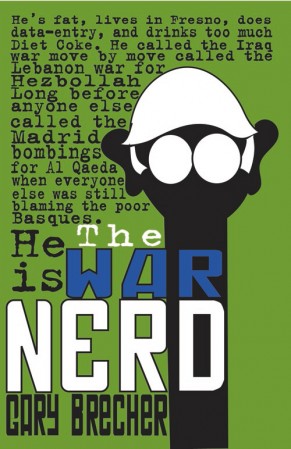
Click the cover, buy the book!

This article was first published in The eXile on November 5, 2007
FRESNO, CA — By the time you finish this column you will be able to destroy huge buildings, kill hundreds of people in a few minutes, and strike terror into your enemies. And all you need is stuff that I guarantee you already have around the house.

Sound too good to be true? Well, hold on to your hard-ons, because there’s more! This weapon is so impossible to trace that well-trained terrorists all over the world use it to clean up evidence after an operation.
When you realize its potential, you’ll wonder why more irregular armies aren’t using it already. If you’re me, you’ll wonder why you haven’t done it yourself.
You’ve probably figured out what I’m talking about by now. It’s our oldest weapon: fire.
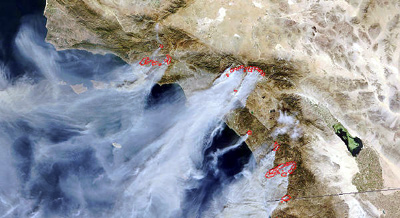
Beavis’ dream come true
I got the idea watching Malibu burn. Oh, man, that was the best day off I’ve had in years. Regular porn doesn’t do much for me, but those clips of “heartbroken house owners” sobbing—man, I was just about creaming in my expand-o-waist black slacks. And talk about guilt-free porn! There’s no downside to watching movie producers’ mansions turn into toxic smoke. Don’t tell me I’m the only Inland Californian who laughed his head off at those follow-up pictures of the Prez hugging teary-eyed billionaires. They all looked like my bank manager. I can’t think of anybody whose houses I’d like to see burned up more, and I wouldn’t mind if their precious purse dogs happened to get forgotten in the big BMW bug-out once the flames made it past those “This Property Protected by….oooh owww hot!” signs. Those properties were protected by zip, nada, a whole lotta nuthin’. You can’t scare a fire, you can’t shoot it. The Mongols and Wehrmacht combined would have to run from a good ol’ SoCal brushfire. That’s a weapon, baby.
And there’s Bush streaking cross-continent on Air Force One to hug the “victims,” with his aides hissing into the ear unit: “Psst! Do ‘compassion’! Squirt some tears, dammit!”
Some websites are already saying what went through my head the second I saw those flames: somebody got smart and stopped playing with bombs and went back to basics, back to what works. Mighta been al Quaeda, but might just as well have been some nut who got fired for not showering because God told him not to. Lotta what they call “agendas” out there. Lotta Bic lighters too. Which means about half the population of this nuthouse qualifies as a suspect.
That’s the beauty of fire: anybody can do it. Actually that’s just one of about a dozen advantages that arson has over bombs. Let’s run ’em down, info-mercial style, Bomb vs. Arson:
Bomb: very tricky to make; easy to score an “own goal” (blow yourself up learning the trade); requires a detonator, very tightly controlled—”not sold at any store” as they say on those sad Oldies Compilation ads; requires electrical expertise, the one thing even most handyman types can’t handle; leaves traces on bomber’s hands, clothes and car; often fails to work; takes a truckload of fertilizer to bring down big buildings; can’t spread beyond immediate target area.
In an infomercial, this is where Christie Brinkley pops up to say, “Gosh Chuck, that sounds way too complicated for me! Isn’t there an easier way for me to lay waste to an enemy city with no risk or obligation?”
And the MC, some unemployed alkie who used to be on Days of Our Lives, says, “There sure is, Christie! Just look at all the advantages you get with our Arson package:

Fire: so easy a caveman, or Douglas Feith, can start one
*So easy to make a little kid can do it. In fact, they do, all the time. Mommy’s Bic plus Daddy’s La-Z-boy equals no more house and BBQ baby. Oldest story in the world. Ever see a toddler make an effective pipe bomb? (Pipe bombs are the worst weapons in the world anyway. The only thing they’re good for is quick amputation of the pipe bomber’s hands and eyes—Nature’s way of saying, “thy genes ye shall not pass on!”)
*Unless you’re one of those toddlers, you won’t get killed by your own arson. Not that hard to walk away from a brushfire—when it’s just getting started. Later, not so easy. But that’s the whole point. In other words, very safe for the arsonist.
*No detonator needed. In fact, no tricky electronics whatsoever. So easy a caveman could do it, and did.
*No traceable chemicals. What are they gonna say if they ever get lucky enough to identify you, “Hey, the suspect has handled gasoline! And a lighter!” Until they start taking smokers off jury lists, and they might in this fucked-up state, no jury on the planet’s going to convict you for handling a 98 cent Bic lighter. And as for gasoline, imagine the interrogation: “We found gas all over your hands, firebug!” “Uh, I used the self-serve and it spilled.” Long awkward silence, ending with you walking out into the daylight, smiling in quiet pride at that big black smoke column over Malibu.
*Unlike bombs, a fire can’t fail to go off. It doesn’t take an Edison to make sure your fire is working. You could send the dumbest guy on the planet to carry out the mission—and according to Tommy Franks, the dumbest guy on the planet is ex-Undersecretary of Defense Douglas Feith—and he’d get it right.
“Mr. Undersecretary, do you have ignition?”
Feith: “Uh…wha’?”
“Mr. Undersecretary, is the brush now burning?”
Feith: “Oh yeah, hee hee… Pretty fire!”
“Excellent, Mr. Undersecretary, now please vacate the area.”
Feith: “uh?”
“Get in the car and go, ya moron!”
It would in fact be Feith’s first successful mission. That’s fire for ya: a real morale-builder, a real resume-packer.*And I’ve saved the best for last: fire is what the pros call a “force multiplier.” Meaning it goes on and on an on, long after that Energizer bunny is fricasee’d in the ashes, a gourmet treat for any coyote willing to get its paws burnt.
Unlike bombs, the size of the fire you set has no relation to its effect. You take a Bic and apply it to some dry weeds upwind of Malibu at the end of the dry season, and that two-inch flame ends up forcing some producer to reschedule his next pool party and restock his cocaine stash. (I bet that “toxic smoke” they warned about in LA was more than toxic, bet it was a real freebase reek.)
A fire that takes one second to start can burn a city five miles away, down to the ground. That makes fire way more effective than most nukes. And a lot easier to make.
 Irregular warfare’s Agent Orange
Irregular warfare’s Agent Orange
The real question is why it isn’t used more often. Of course we have fire weapons like napalm, flamethrowers, and incendiary bombs, but all of them require hi-tech conventional weapons. And for the foreseeable future, conventional warfare ain’t shit. Until otherwise notified, we’re talking irregular warfare, the only kind that matters.
The Japanese tried sending fire balloons over the Western US in WW II, but that was sheer stupidity. The vector for fire is humans. You use people to start fires. And people, like I keep telling you over and over, are the only essential weapon for an irregular force. In this case, that means one clean-cut Al Qaeda sympathizer who’s learned to smile all the time, keep a job, avoid talking about politics and drive a neutral-looking car (my pick would be a Honda, nothing more boring or invisible than an Accord). There he is standing on a hill inland of Malibu. He’s been mowing his lawn, watching the NBA, blending in like a fanatic, and now that the Santa Ana’s blowing toward the prime real estate on the ocean, he’s ready. He takes a casual glance up and down the road, tosses a little sterno stove into the brush, drives on. Three days later Tori Spelling collects ten million for her beachfront mansion.
Now, in the interests of disclosure and transparency and all that good shit, I should mention that I’m sort of an accused arsonist myself. You may remember that my old friend Victor “-y” Davis Hanson took a few minutes off from his usual dayjob—sucking Cheney’s dick—in order to accuse me of trying to burn down his vineyards. As if. As if I’d work up a sweat lugging gascans into some dusty farm. I’m more the morale-building, inspirational type. I encourage people to find the inner arsonist trapped inside themselves; I don’t go out and wobble my flab doing torch jobs personally.
But Vic must be in love with me or something, because he won’t drop the grape-torching business. He’s written about it at least twice since he first dropped that dime on me in the pages of National Review. And there’s a lesson in that. What it shows is how the neocon mind works. First, they never ever admit they’re wrong–but we all knew that already. The more interesting lesson is how, even though they talk big, they think so small. So lame.
Because if I was going to do a burn on my pal Vic—which I’m not planning to, but if I was—it wouldn’t be some ridiculous, pointless try at burning his grape vines, especially when the poor fool wrote a whole book proving vines don’t burn too well.
No, Vic, I don’t think like that. I think like a real irregular. If I wanted to introduce you to the possibilities of fire as a weapon I’d just attend one of those lectures you give to tell nervous old GOPers that Iraq is going swell, just swell. (Can’t believe the bastard gets paid to do that. Most of the people I know spend their lives lying for nothing.)
I wouldn’t even need a ticket in. Just a 55-gallon drum, a dolly to wheel it up to the entrance, an air conditioner repair guy’s overalls (size XXL, but then most air conditioner repair guys are XXL) and a couple of bike locks, with chains. I’d wait till all those gullible hicks had filed in to the hall, and I’d wait for the applause when VD took the podium. Then I’d tilt up the dolly and get to work, singing something in character—maybe “Ring of Fire”—you can’t go wrong with the Man in Black. First I’d padlock all the emergency exits, then I’d pour all 55 gallons into the lecture hall. The drum would be labeled “cleaning solution” and it’d be truth in advertising, because nothing cleans out a crowded lecture hall faster than burning gasoline. No sprinkler system in the world can handle that volume, and if the gas don’t kill ’em, the stampede when they see the first flames will.
What I like to imagine is Victor up there passing the optimistic word to the very end. As the flames try to get his attention, he’ll be using all that mental discipline he used since the invasion to deny there’s even a problem, “…aside from some lingering embers in a few provinces of the lecture hall, this fire is completely contained.” By this time the hall will be totally black with smoke, but Vic is a gamer and he’ll drop his favorite history bomb on anybody still alive: “Things looked black in 1864, too, you know! And what about the Battle of the—cough, ack!—Bulge? Iwo Jima? The Pusan…the Pusan…” Just about that time Vic’s mighty voice would be silenced for good because his larynx would be even blacker than 1864 and Pusan put together, blacker than a forgotten In-N-Out burger that’s sat all day on the flame broiler while the rookie cooks got high in the employee toilet…
And please don’t tell me this kind of atrocity would “backfire” on the firebug. Hiroshima, Dresden, Tokyo—some pretty big BBQs, and they didn’t backfire on anyone. We’re just talking about the lo-tech irregular-warfare versions of that, and to a serious guerrilla, there are no illegitimate targets. Everything is up for burning. And don’t tell me this kind of “brutality” doesn’t work, either. Let me tell you about the Cinema Rex. Ever see a movie there? I bet you didn’t, because for one thing it was in Abadan, the big oil-refining island off Iran. And for another thing, some of Khomeini’s holy warriors burned down the Cinema Rex just before the Old Man himself came back to Iran and booted the Shah.
See, the Rex had a special feature for kiddies: every Friday after school was out, all the foreign oil-workers’ children would pile into the Rex to watch cartoons. Even a Muslim couldn’t object to that, right?
Wrong. There is very little that a real Khomeini-ite can’t object to, and for them the idea of kids watching movies on a Friday was so horrible that it just naturally called for one of the Faithful to walk around the Rex that Friday afternoon padlocking all the doors, then pouring a couple five-gallon cans of gasoline under the doors and in the windows, and then setting it on fire. Hundreds of children dead.
I’ve never forgotten that story. Made me so sick, as if Carter’s disgusting puss-out wasn’t already nearly killing me, young as I was.
But nobody else remembers it. Did you? Betcha didn’t. Betcha never heard of it. And the Iranians weren’t bothered at all. A few weeks later, hordes of the stupid fucks swarmed over Tehran to welcome the glorious Imam Khomeini. And a few years after that, hordes of kids not much older than the ones that got crisped in Abadan ran through machine gun fire or volunteered to be human mine detonators for Iranian human-wave attacks across the Shatt al-Arab a few miles from Abadan.
Don’t tell me terror doesn’t work. Only amateurs think that. And if the Cinema Rex didn’t hurt Khomeini’s popularity, if Dresden didn’t stop London putting up a statue to Bomber Harris, you honestly expect me to even pretend I’m not giggling, damn near jerking off, watching producers’ houses burn?
Wake up and smell the ashes.
This article was first published in The eXile on November 5, 2007
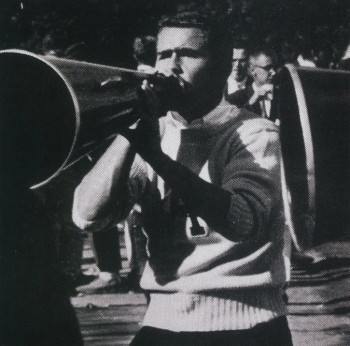
From today’s edition of NSFW Corp
FRESNO—Today’s the Big Anniversary, so what better day to size up Obama’s war record than the day that also launched my career as a professional War Nerd.
When you look back at Obama’s wars, you get a pretty clear idea what went wrong over the last four years. It wasn’t the way Obama’s team handled the wars. Truth is, they did damn well at that, better than I ever thought they would.
The real problem is that they don’t know what world they’re living in. These are people who’ve spent their lives getting straight A’s, collecting gold stars, avoiding mistakes. And they think war is just like all those other little hurdles you face in life.
That’s why they’ll never get credit for any of it. They have this delusion that sanity matters, and they’ve run their wars as sanely and boringly as an exterminator going after termites.
It’s sensible, it’s semi-effective, and it irritates the life out of the 99%. I don’t mean the Occupy 99%, all those “goodhearted ordinary Americans”; that’s a totally made-up imaginary species invented by people just as naive as Obama’s crew. I mean the real 99% of us living our rotten lives out there, mean and dumb and miserable, just waiting for some gore we can really get behind.
Obama just doesn’t understand his job as war chief of this big crazy tribe…(Continued)
To read the rest of this War Nerd article surveying the Obama wars, click here.
This article was published at Not Safe For Work Corp, where Gary Brecher has just signed on as a new regular columnist. To read The War Nerd columns and more NSFWCORP wretched wisdom (with jokes), subscribe for the monthly price of a bottle of Diet Coke: http://www.nsfwcorp.com/subscribe
Would you like to know more? Gary Brecher is the author of the War Nerd. Send your comments to gary dot brecher at gmail dot com. Read Gary Brecher’s first ever War Nerd column by clicking here.

Click the cover, buy the book!

In the wake of this week’s white supremacist massacre of unarmed Sikh worshippers in Wisconsin, The eXiled proudly reposts a War Nerd classic first published in The eXile in July 2007:
FRESNO, CA — I think I’ve finally found a religion I can convert to. I’m thinking of turning Sikh. And we’ll just slide right by all the puns popping into your little heads, if you don’t mind. The Sikhs are just the coolest warrior tribe around. Take their scripture. (more…)
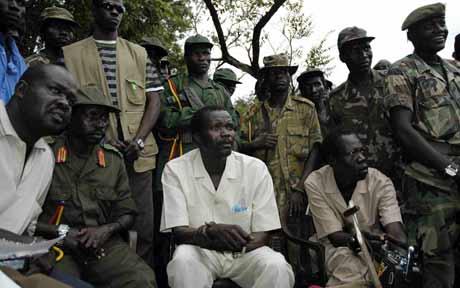
This article is a War Nerd Classic
Christians are stone killers. You put a Christian and a lion in an arena and I’ll bet Toyotas to Subarus the Christian’ll have the lion for lunch. Just look around you: lions are just about extinct, but the whole world is full of Christians singin’ about God’s love, ready to disembowel anybody who won’t join the chorus. (See my guide to Christian Missionary Martyrs as the front-line in Christian Jihads at the end of this article.) (more…)
(more…)

This article was first published in The eXile on May 4, 2007. We are reprinting it to commemorate today’s alleged “last day of the Iraq war.”
FRESNO, CA — A funny thing happened on the floor of the Senate last week. Somebody asked a serious question: “If the war in Iraq is lost, then who won?”
Of course Sen. Lindsay Graham, the guy who asked the question, didn’t mean it to be serious. He was just scoring points off Harry Reid, the world’s only Democratic Mormon. Reid had made a “gaffe” by saying in public what everybody already knows: “The war in Iraq is lost.” When you say something obviously true in politics, it’s called a “gaffe.” (more…)








 Irregular warfare’s Agent Orange
Irregular warfare’s Agent Orange












